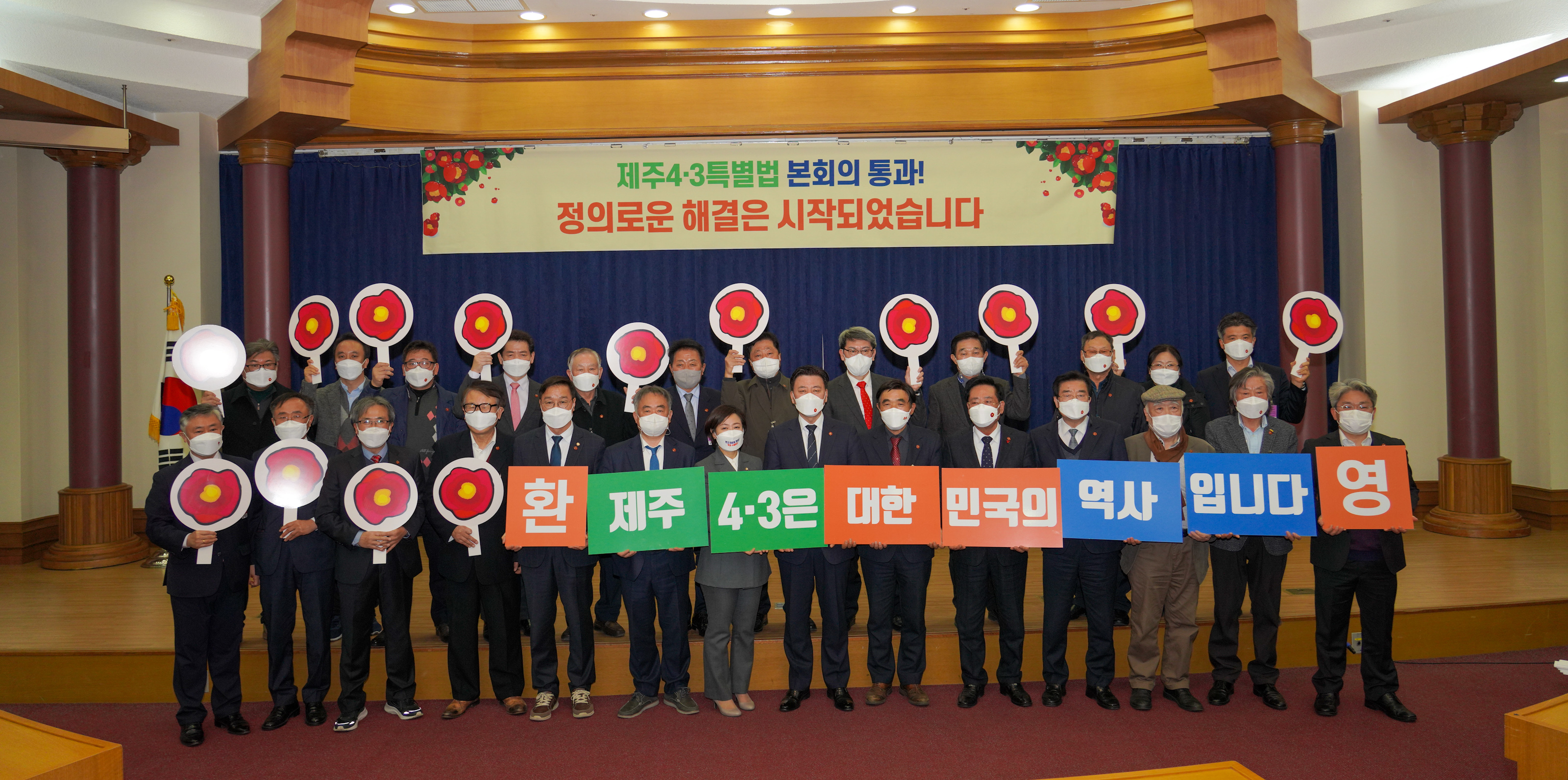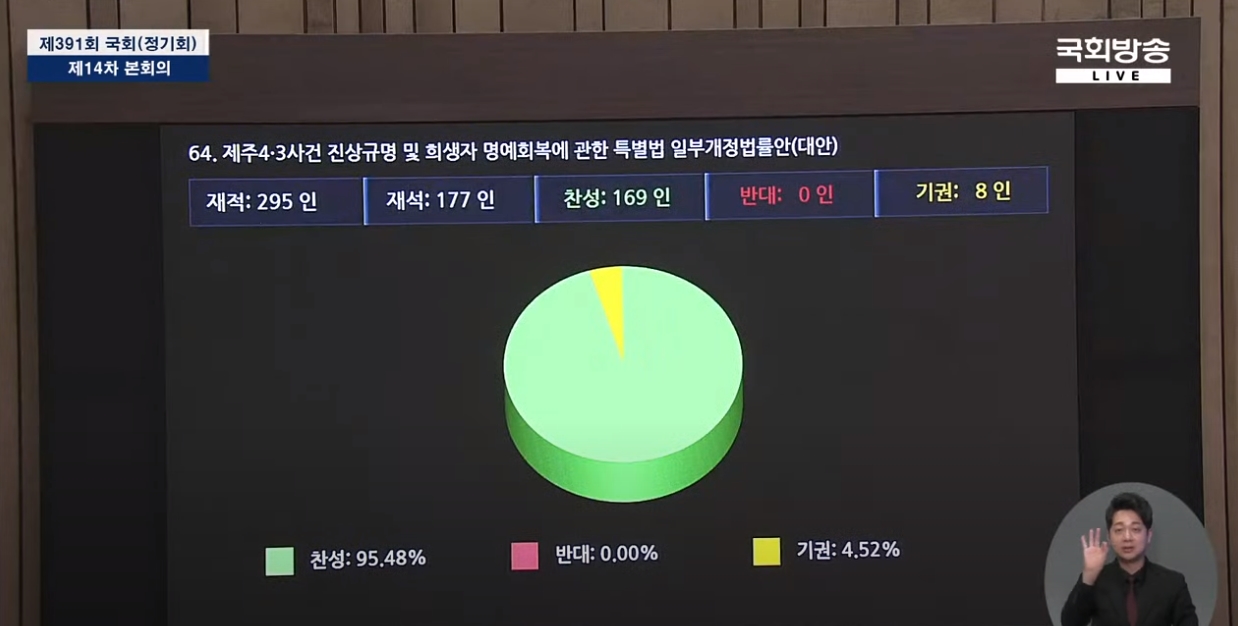Revised Jeju 4·3 Special Act passed at the National Assembly plenary session, taking one step closer to the resolution of Jeju 4·3
Voted on Nov. 9…new clause designating 90 million won per victim included
Revision collectively welcomed by 4·3-related institutes and organizations

The revision of the Jeju 4·3 Special Act is celebrated on Dec. 9, 2021, by Hyun Ki-young, a novelist, Oh Im-jong, chairman of the Association of the Bereaved Families of Jeju 4·3 Victims, Song Seung-moon, former chairman of the Association of the Bereaved Families of Jeju 4·3 Victims, Koo Man-seop, acting governor of Jeju Special Self-Governing Province, Jwa Nam-soo, chairman of the Jeju Special Self-Governing Provincial council, Yang Jo Hoon, director of the Jeju 4·3 Peace Foundation, and members of the National Assembly and the Jeju Special Self-Governing Provincial Council.
The motion on the partial revision of the Special Act on Discovering the Truth of Jeju 4·3 and Restoration of Honor to the Victims (Jeju 4·3 Special Act) made the final legal hurdle by being passed at the National Assembly plenary session.
Late on Dec. 9, 2021, the National Assembly held the 14th plenary meeting of its 391st regular session and held a vote on the bill on the revision of the Jeju 4·3 Special Act.
Rep. Oh Young-hun, who proposed the revision on Oct. 28, represented those who made joint signatures, explained the purpose of the bill, and followed with a report on the examination of the bill. The bill was put to vote with the presence of 177 out of 295 incumbent council members. The passing of the proposed revision was determined with 169 affirmative and 8 blank votes.
The revised statutes detail the equal provision of 90 million won to each Jeju 4·3 victim (including those who died or disappeared due to Jeju 4·3) to fully compensate for any psychological damage (in the form of consolation money) and/or immediate damage caused. “Compensation money” has been selected to define both indemnification and compensation in the section titled “Provision of Special Support Including Consolation Money, etc.”
The clause also determines that those who bear residual harm or who experienced unlawful conviction will be paid the compensation money of not more than 90 million won. In inheritance of compensation money, persons become inheritors in the order of the ancestor’s spouse and lineal descendants (i.e. children and grandchildren), the ancestor’s lineal ascendants (i.e. parents and grandparents), the ancestor’s brothers and sisters, and the ancestor’s collateral blood relatives within the fourth degree. If the ancestor has no inheritor who is at least his or her fourth-degree blood relative, a relative within the fifth degree will be recognized as holding the right of inheritance on the condition that the relative performs the victim’s ancestral rites or maintains his or her grave.
The Jeju 4·3 Committee, a national body responsible for matters relevant to Jeju 4·3 issues, will establish a deliberation subcommittee to pay the compensation money through the subcommittee’s deliberations and decisions.
A clause was also added to the revised act that stipulates the exoneration of 2,530 victims who were unlawfully convicted during the two courts-martial in 1948 and 1949 by entitling the prosecutor to request ex officio retrials for their collective cases. Another additional clause stipulates that the victims shall not be prohibited from claiming criminal compensation under the Act on Criminal Compensation and Restoration of Impaired Reputation even after receiving the compensation money.
The bill also contains a new clause prescribing the interest in arrears. This clause was once at risk of being deleted because ministries and government departments had failed to reach an agreement.
During the deliberation process, however, the Legislation and Judiciary Committee of the National Assembly decided to delete the special clauses on individual lawsuits demanding affiliation and marriage. Originally, these clauses were proposed to exonerate the victims whose birth or marriage failed to be recorded properly due to Jeju 4·3 by correcting their family relations registers. The Court Administration has expressed objection to the creation of these statutes with concerns over the possibility that approval of such cases may cause instability to the systems of the Act on Registration of Family Relations and the Inheritance Tax and Gift Tax Act.
To complement the deleted clauses, the Ministry of Interior and Safety plans to assign an external agency in January 2022 to undertake research on institutional enhancement for the correction of incorrectly recorded family relations between the Jeju 4·3 victims and their spouses and/or children.
The National Assembly voting results for the bill on the revision of the Jeju 4·3 Special Act show no negative votes.
The passage of the motion at the National Assembly plenary session was highly praised by institutes and organizations related to Jeju 4·3.
The Association of the Bereaved Families of Jeju 4·3 Victims (chairman: Oh Im-jong) announced that the association welcomes the decision, saying that “the revision has set up a new milestone which will enable Jeju 4·3 to be proudly established as a pivotal point in Korean history so that the nation’s past wrongful events will be justly resolved.”
The association also noted that the latest revision is highly significant in that state authorities will be held accountable for Jeju 4·3, and corresponding national compensation will be made for the damage to victims. However, victims’ families expressed regret about the deletion of the special clauses concerning family relations because their absence will highly likely exclude those de facto family members of the victims from the categories of persons holding the rights of inheritance under the current law. In-depth discussions need to promptly take place to complement and overcome the aforementioned issues, they emphasized. Expressing gratitude to their fellow citizens who have supported the revision, the Jeju 4·3 victims’ families asked for continued active participation throughout the course of justly resolving Jeju 4·3.
The Jeju 4·3 Peace Foundation (president: Yang Jo Hoon) also issued a statement to welcome the National Assembly’s decision. According to the foundation, the revision of the Jeju 4·3 Special Act realized national compensation for the damage, which is considered a symbolic measure for the restoration of honor to the victims. This proved once again that Jeju 4·3 is an exemplary solution to the nation’s past wrongdoings in contemporary history, it stressed. Concluding the statement, the foundation expressed its determination to strengthen cooperation with related parties so that the measures ensuing the revision will be addressed in a prompt and seamless manner.
The Jeju 4·3 Research Institute (president: Lee Kyu-bae; director: Huh Young Seon) explained in its announcement that the government-level research on institutional improvement will be conducted in the following year since the bill has been passed with the special clauses concerning family relations deleted. “As the bill fails to fulfill the long-cherished wish of the bereaved families, we will pay keen attention to whether or not the research project is properly managed,” it emphasized. The institute also clearly stated that “The Jeju 4·3 Special Act must be legislation not for exclusion but for inclusion,” calling for proactive interest in the resolution of the so-called ‘excluded victims.’
The Jeju 4·3 Commemorative Project Committee, the Pan National Committee for Jeju 4·3, and the Association of Jeju 4·3 Victims’ Bereaved Young Family Members in Seoul also welcomed the passage of the bill, with an additional comment stressing the necessity of completing the remaining tasks to resolve Jeju 4·3.